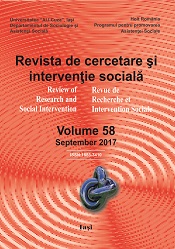Quality of Life and Social Justice in Romania: Measuring Quality of Life
Quality of Life and Social Justice in Romania: Measuring Quality of Life
Author(s): Elena ZamfirSubject(s): Social Sciences
Published by: Expert Projects Publishing
Keywords: quality of life; subjective and objectives indicators; general satisfaction with life; wellbeing; welfare; happiness; social state;
Summary/Abstract: Starting from the main components/dimensions of the quality of life, the paper aims an analysis the role and the place of social indicators, objective and subjective ones, in achieving life satisfaction of the Romanian population during transition. Thus, the study focuses on the main factors with a decisive impact on the quality of life: the national economy, social state, community, and individuals’ performance in Romania compared with the European standards. The paper underlines that despite the fact that within both national and European official statistics the range of ‘objective’ indicators for the quality of life are at the forefront of attention (see living standard, income, employment, etc.); the specific/proper indicators for the quality of life are the subjective ones. In fact, quality of life involves par excellence an evaluative structure. First, it supposes a set of indicators of state which record the actual characteristics at a given moment for all life dimensions, and second, a set of evaluation criteria in relation to which we may assess this state. From this perspective, the paper analyses some recent researches and statistical data of the national and international surveys related to individual general satisfaction with life. It is estimated based on subjective indicators regarding the overall positive experience life has as outcome, and the perceived quality of the basic components of life. In addition, the paper focuses on social policies in the period of Romanian transition with the great impact in life satisfaction. From this point of view, the evaluation process of social inclusion of vulnerable groups in post-communist Romania is relation with the main indicators of social justice. Therefore, as a conclusion, an analysis of the real state of the quality of life must take into account next to objective indicators of state (essential for the living conditions) also the subjective ones. In fact, they capture the reaction/perception of the population about the given socio-economic context (the subjective well-being). Subjective indicators emerge much more frequently in academic research analyses. Sometimes, as a rule, researches focused to happiness as an individual general satisfaction with life indicator. The human condition emerges thus as basic milestone and dimension for the quality of life.
Journal: Revista de Cercetare şi Intervenţie Socială
- Issue Year: 2017
- Issue No: 58
- Page Range: 34-53
- Page Count: 20
- Language: English

